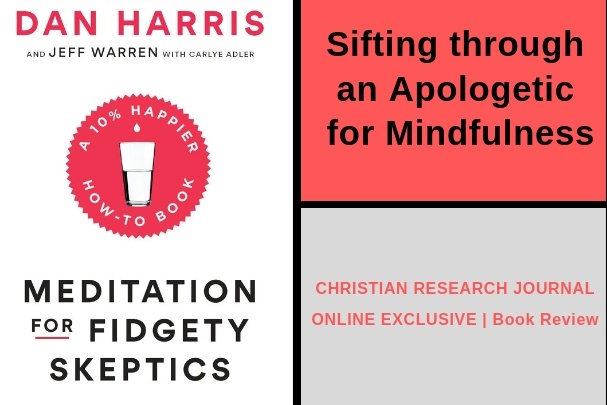A
Book Review of
Meditation for Fidgety Skeptics: A 10% Happier How-to Book
Dan Harris
(Spiegel and Grau, 2017)
The American mind is, on the whole, always buzzing, planning, or worrying. Cell phone text messages ding. Exigencies flood our email inboxes. In the past minute, three popup links have appeared on my laptop screen, and my dog emerged insisting that he needs to be taken outside. The cacophony of calls for our attention tend to increase our anxiety as well, because we are simply trying to process and keep up with it all.
Journalist and author Dan Harris knows that high-speed anxiety all too well. Motivated by an embarrassing on-air panic attack, he transformed into a self-proclaimed mindfulness meditation evangelist. Harris has since launched a smartphone app and a podcast, and has written two books on the topic. This review covers the second of those: Meditation for Fidgety Skeptics. Unlike his first book, 10% Happier, which was more of a memoir, this one intends to address objections and win over skeptics (hence the title). It is, in short, an apologetic for mindfulness.
Mindfulness is a form of meditation primarily drawn from the Theravada school of Buddhism, where the meditator cultivates a deep awareness on one’s immediate context without judging or attaching to it. For instance, concentrating only on one’s own breathing is a common way to meditate. The book follows Harris, coauthor and meditation leader Jeff Warren, and their team as they travel across the country, spreading the message of mindfulness. The book’s format is broken up into short stories from the road trip, punctuated by invitations for the reader to pause and meditate in the mindfulness tradition. This layout is smart. Humans are wired to love stories, and Harris tells many. He highlights celebrities such as Josh Groban, underprivileged teens, and members of a police department. These are highly relatable people, shown growing through mindfulness practice. These stories use humor and transformation of highly relatable people to give the reader hope for personal change. Once the meditation skeptic (the reader, presumably) has something to hope for, Harris delivers the prescription in the form of short, intentionally realistic meditations that one can either read about or practice. Before the skeptic even knows it, the story has softened his or her posture, and has opened the door to a guided mindfulness test run right there on the page.
The book is written in a disarmingly colloquial, personal style. It also epitomizes the fidgety style he’s trying to win over. Harris is funny, self-deprecating, and has his finger on the pulse of an inattentive culture that is looking for some peace and meaning amidst a loud, confusing, and fast-paced marketplace of ideas. But as the cliché goes, not all that glitters is gold. While the book aims to portray mindfulness in its more secular form, the Buddhist aim to detach from the self is still present. This can be seen in areas such as Harris’s statement that “thinking is a wonderful servant but a terrible master” (p. 47), and the counsel that we should not to identify with our emotions (170). Christians can train the mind in similar ways, but we need not hold back from fully identifying with our own human existence. We are, unlike in Buddhism, a real, valuable self, made in the image and likeness of God (Gen. 1:26).
Moreover, the Christian has a missional reason to train the mind (2 Cor. 10:5) rather than quiet it, and to consequently work on her character. Christians are to show the nations the glory to God by becoming who He created us to be: the best versions of ourselves. By contrast, any ultimate purpose is conspicuously absent from Harris’s apologetic. Mindfulness is a poor substitute for the personal development richness found in Christian sanctification.
In sum, while mindfulness exercises meant to quiet and discipline the mind can be practically helpful and spiritually healthy, a mindfulness heavily steeped in the ultimately purposeless worldview Harris promotes is neither. Readers of this book should, therefore, avoid any form of mindfulness that does not seem perfectly compatible with the Christian worldview, all the while learning from and appreciating Harris’s culturally savvy, and therefore persuasive, apologetic approach. —Sarah Geis
Sarah Geis teaches apologetics and ethics at Denver Seminary and also is the director of the Gordon Lewis Center for Christian Thought and Culture. She is currently a PhD student in philosophy of religion at the University of Birmingham, UK.









